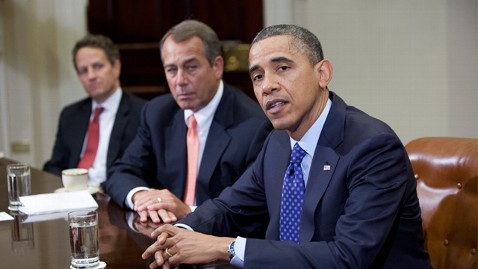Software millionaire John McAfee has been returned to an immigration detention cell in Guatemala after being rushed to a Guatemala City hospital via ambulance.
McAfee, 67 -- who soon may be deported back to Belize, where authorities want to question him about the shooting death of his neighbor -- was reportedly found prostrate on the floor of his cell and unresponsive.
He was wheeled into the hospital on a gurney. Photographers followed in pursuit right into the emergency room, but as emergency workers eased McAfee's limp body from the gurney and onto a bed and began to remove his suit, he suddenly spoke up, saying, "Please, not in front of the press."
Earlier today, McAfee had complained of chest pains, raising concerns he might be having a heart attack.
However, that did not appear to be the case. Hours after his emergency, hospital officials sent McAfee back to the detention center, telling ABC News they found no reason to keep him overnight.
In a phone interview overnight, McAfee told ABC News, "I simply passed out, everything went black."
He said he hit his head on the floor when he collapsed. McAfee explained that for the past 48 hours he hasn't eaten and had very little to drink.
McAfee had been scheduled to be deported to Belize, ABC News has learned. But a judge could stay the ruling if it is determined that McAfee's life is threatened by being in Belizean custody, as McAfee has claimed in the past several weeks.
McAfee's attorneys hope to continue delaying the deportation by appealing to the Guatemala's high court on humanitarian grounds.
Raphael Martinez, a spokesman for the Belize government, said that if McAfee is deported to Belize, he would immediately be handed over to police and detained for up to 48 hours unless charges are brought against him.
"There is more that we know about the investigation, but that remains part of the police work," he said, hinting at possible charges.
He added that a handover by Guatemala would be "the neighborly thing to do."
A spokesman for the U.S. embassy in Guatemala said that "due to privacy considerations," the embassy would "have no comment on the specifics of this situation," but that, "U.S. citizens are subject to the laws of the countries in which they are traveling or residing, and must work within the host countries' legal framework."
Guatemala's National Police/AP Photo
Software Founder Breaks Silence: McAfee Speaks on Murder Allegations Watch Video
John McAfee Interview: Software Mogul Leaves Belize Watch Video
Just hours before McAfee's arrest, he told ABC News in an exclusive interview Wednesday he would be seeking asylum in Guatemala. McAfee was arrested by the Central American country's immigration police and not the national police, said his attorney, who was confident his client would be released within hours.
"Thank God I am in a place where there is some sanity," said McAfee before his arrest. "I chose Guatemala carefully."
McAfee said that in Guatemala, the locals aren't surprised when he says the Belizean government is out to kill him.
"Instead of going, 'You're crazy,' they go, 'Yeah, of course they are,'" he said. "It's like, finally, I understand people who understand the system here."
But McAfee added he has not ruled out moving back to the United States, where he made his fortune as the inventor of anti-virus software, and that despite losing much of his fortune he still has more money than he could ever spend.
In his interview with ABC News, a jittery, animated but candid McAfee called the media's representation of him a "nightmare that is about to explode," and said he's prepared to prove his sanity.
McAfee has been on the run from police in Belize since the Nov. 10 murder of his neighbor, fellow American expatriate Greg Faull.
During his three-week journey, said McAfee, he disguised himself as handicapped, dyed his hair seven times and hid in many different places during his three-week journey.
He dismissed accounts of erratic behavior and reports that he had been using the synthetic drug bath salts. He said he had never used the drug, and said statements that he had were part of an elaborate prank.
Investigators said that McAfee was not a suspect in the death of the former developer, who was found shot in the head in his house on the resort island of San Pedro, but that they wanted to question him.
McAfee told ABC News that the poisoning death of his dogs and the murder just hours later of Faull, who had complained about his dogs, was a coincidence.
McAfee has been hiding from police ever since Faull's death -- but Telesforo Guerra, McAfee's lawyer in Guatemala, said the tactic was born out of necessity, not guilt.
"You don't have to believe what the police say," Guerra told ABC News. "Even though they say he is not a suspect they were trying to capture him."
Guerra, who is a former attorney general of Guatemala, said it would take two to three weeks to secure asylum for his client.
According to McAfee, Guerra is also the uncle of McAfee's 20-year-old girlfriend, Samantha. McAfee said the government raided his beachfront home and threatened Samantha's family.
"Fifteen armed soldiers come in and personally kidnap my housekeeper, threaten Sam's father with torture and haul away half a million dollars of my s***," claimed McAfee. "If they're not after me, then why all these raids? There've been eight raids!"
Before his arrest, McAfee said he would hold a press conference on Thursday in Guatemala City to announce his asylum bid. He has offered to answer questions from Belizean law enforcement over the phone, and denied any involvement in Faull's death.



















